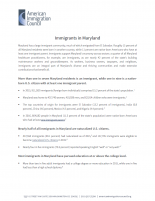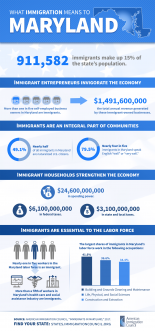- Fact Sheet
Immigrants in Maryland
Published
Maryland has a large immigrant community, with many individuals hailing from El Salvador. Roughly one in seven Maryland residents was born in another country, while one in eight is a native-born American who has at least one immigrant parent. Immigrants support Maryland’s economy across sectors: nearly a third of all Maryland healthcare support workers, for example, are immigrants, as are more than a third of the state’s building maintenance workers and groundskeepers. As neighbors, business owners, taxpayers, and workers, immigrants are an integral part of Maryland’s diverse and thriving communities and make extensive contributions that benefit all.
One in seven Maryland residents is an immigrant, while one in eight residents is a native-born U.S. citizen with at least one immigrant parent.
- In 2018, 915,191 immigrants (foreign-born individuals) comprised 15 percent of the population.
- Maryland was home to 451,208 women, 408,820 men, and 55,163 children who were immigrants.
- The top countries of origin for immigrants were El Salvador (11 percent of immigrants), India (6 percent), China (5 percent), Nigeria (5 percent), and the Philippines (4 percent).
- In 2018, 760,379 people in Maryland (13 percent of the state’s population) were native-born Americans who had at least one immigrant parent.
More than half of all immigrants in Maryland are naturalized U.S. citizens.
- 489,731 immigrants (54 percent) had naturalized as of 2018, and 146,228 immigrants were eligible to become naturalized U.S. citizens in 2017.
- More than four in five (83 percent) immigrants reported speaking English “well” or “very well.”
Most immigrants in Maryland have pursued education at or above the college level.
- More than two in five (43 percent) adult immigrants had a college degree or more education in 2018, while roughly one in five (19 percent) had less than a high school diploma.
|
Education Level |
Share (%) of All Immigrants |
Share (%) of All Natives |
|---|---|---|
|
College degree or more |
43 |
40 |
|
Some college |
19 |
27 |
|
High school diploma only |
19 |
26 |
|
Less than a high school diploma |
19 |
7 |
|
Source: U.S. Census Bureau, 2018 American Community Survey 1-Year Estimates. |
||
Over 126,000 U.S. citizens in Maryland live with at least one family member who is undocumented.
- 275,000 undocumented immigrants comprised 29 percent of the immigrant population and 5 percent of the total state population in 2016.
- 289,091 people in Maryland, including 126,383 U.S. citizens, lived with at least one undocumented family member between 2010 and 2014.
- During the same period, about 7 percent of children in the state were U.S. citizens living with at least one undocumented family member (88,150 children in total).
Maryland is home to thousands of Deferred Action for Childhood Arrivals (DACA) recipients.
- 7,870 active DACA recipients lived in Maryland as of March 2020, while DACA has been granted to 9,932 people in total since 2012.
- As of 2019, 38 percent of DACA-eligible immigrants in Maryland had applied for DACA.
- An additional 5,000 residents of the state would satisfy all but the educational requirements for DACA, and fewer than a thousand would become eligible as they grew older.
One in five workers in Maryland is an immigrant, together making up a vital part of the state’s labor force in a range of industries.
- 646,170 immigrant workers comprised 20 percent of the labor force in 2018.
- Immigrant workers were most numerous in the following industries:
|
Industry |
Number of Immigrant Workers |
|---|---|
|
Health Care and Social Assistance |
119,261 |
|
Professional, Scientific, and Technical Services |
75,786 |
|
Construction |
75,266 |
|
Accommodation and Food Services |
69,572 |
|
Retail Trade |
60,993 |
|
Source: Analysis of the U.S. Census Bureau’s 2018 American Community Survey 1-year PUMS data by the American Immigration Council. |
|
- The largest shares of immigrant workers were in the following industries:
|
Industry |
Immigrant Share (%) |
|---|---|
|
Construction |
30 |
|
Accommodation and Food Services |
26 |
|
Administrative & Support; Waste Management; and Remediation Services |
24 |
|
Other Services (except Public Administration) |
24 |
|
Health Care and Social Assistance |
23 |
|
Source: Analysis of the U.S. Census Bureau’s 2018 American Community Survey 1-year PUMS data by the American Immigration Council. |
|
Immigrants are an integral part of the Maryland workforce in a range of occupations.
- In 2018, immigrant workers were most numerous in the following occupation groups:
|
Occupation Category |
Number of Immigrant Workers |
|---|---|
|
Construction and Extraction |
59,287 |
|
Management |
59,235 |
|
Healthcare Practitioners and Technical |
54,025 |
|
Office and Administrative Support |
53,525 |
|
Sales and Related |
52,001 |
|
Source: Analysis of the U.S. Census Bureau’s 2018 American Community Survey 1-year PUMS data by the American Immigration Council. |
|
- The largest shares of immigrant workers were in the following occupation groups:
|
Occupation Category |
Immigrant Share (%) |
|---|---|
|
Building and Grounds Cleaning & Maintenance |
35 |
|
Life, Physical, and Social Science |
34 |
|
Construction and Extraction |
34 |
|
Healthcare Support |
32 |
|
Food Preparation and Serving Related |
26 |
|
Source: Analysis of the U.S. Census Bureau’s 2018 American Community Survey 1-year PUMS data by the American Immigration Council. |
|
- Undocumented immigrants comprised 6 percent of Maryland’s workforce in 2016.
Immigrants in Maryland have contributed billions of dollars in taxes.
- Immigrant-led households in the state paid $8.0 billion in federal taxes and $4.1 billion in state and local taxes in 2018.
- Undocumented immigrants in Maryland paid an estimated $373.5 million in federal taxes and $242.3 million in state and local taxes in 2018.
- Maryland DACA recipients and DACA-eligible individuals paid an estimated $33.7 million in state and local taxes in 2018.
As consumers, immigrants add tens of billions of dollars to Maryland’s economy.
- Maryland residents in immigrant-led households had $27.6 billion in spending power (after-tax income) in 2018.
Immigrant entrepreneurs in Maryland generate nearly $2 billion in business revenue.
- 66,350 immigrant business owners accounted for 23 percent of all self-employed Maryland residents in 2018 and generated $1.7 billion in business income.
- In 2018, immigrants accounted for 31 percent of business owners in the Washington, D.C., metropolitan area (encompassing D.C. and parts of Maryland and Virginia), and 18 percent in the Baltimore/Towson/Columbia metro area.
We can't let the government keep us in the dark.
Join us in demanding transparency and holding them accountable in court to protect our democracy.
Donate Now

